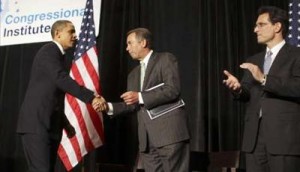An unusual event took place yesterday as Congressional Republicans held a policy retreat and invited President Obama to come speak with them. He actually came.
Afterwards, the Republican leadership said it was a good first step, but no agreements resulted from the gathering. Obama declared to them that he was not an ideologue. I haven’t seen video of the reaction to that statement. It would probably be one of those things Mastercard can’t buy—priceless.
The event was televised, unlike the healthcare meetings. Republicans took the opportunity to be direct with Obama, calling him on a number of issues. They made it clear to him that they had viable alternatives to the things he and the Democrat Congress tried to ram down everyone’s throats. The problem, they said, was that the Democrat leadership shut them out, never allowing them a place at the table in formulating policy.
Accounts of the meeting from participants is that it was open and honest debate, something that has been missing from Congress since the 2006 elections. But no one on the Republican side was confident that the president is now seriously entertaining their alternatives.
The cynical interpretation is that this provided a great photo op and a way to put on a show about openness. Is the cynical interpretation correct? Time will tell.
While I would welcome real change that will restore genuine hope, it’s going to take more than one event to convince me that Obama’s underlying philosophy or his Chicago-style tactics have been reformed.
Some may say, “But as a Christian, you have to believe the best, give the benefit of the doubt.” I say, “As a Christian, I have a duty to discern that which is real from that which is phony.”
Phoniness has been such a trademark of this president and his party that it would be foolhardy to believe yesterday was anything more than a political ploy on Obama’s part. If evidence should surface that something substantial does come from it, I will change my analysis—but only then.

